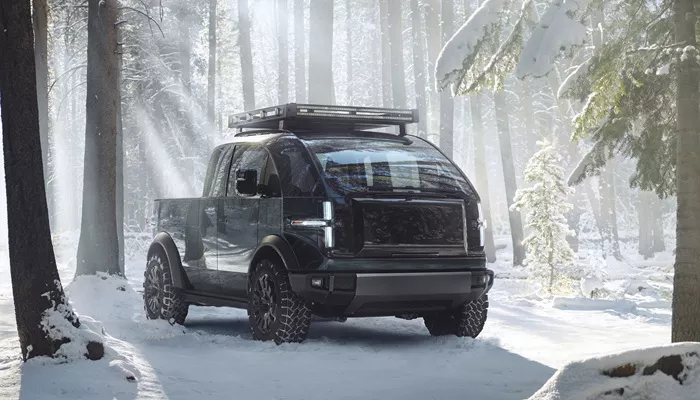The Canoo pickup truck is one of the most talked-about new vehicles in the electric pickup truck segment. As a newcomer, Canoo has drawn attention for its unique design and innovative electric platform. This article explores the detailed history, key characteristics, pricing, and performance of the Canoo pickup truck. We will also compare it within the broader context of pickup trucks and analyze its potential impact on the market.
History of Canoo Pickup Truck
The Origins of Canoo
Canoo is a relatively young automaker founded in 2017. The company started with a vision to revolutionize electric vehicles by creating versatile, affordable, and innovative EV platforms. Unlike traditional manufacturers, Canoo chose a “skateboard” platform design that houses the battery and drivetrain components flat under the vehicle floor. This platform allows for flexible vehicle bodies to be built on top.
Development of the Pickup Truck Model
Canoo revealed its first electric vehicle concepts in 2019 and 2020, focusing initially on multipurpose vans and lifestyle vehicles. The pickup truck, officially named the Canoo Pickup Truck, was unveiled later as a part of their strategy to enter the growing electric truck market. This model is based on the Canoo Lifestyle Vehicle platform but is re-engineered for tougher utility and increased payload capability.
Market Context and Competition
Electric pickup trucks have surged in popularity with several major players like Tesla Cybertruck, Rivian R1T, and Ford F-150 Lightning. Canoo entered this competitive space by emphasizing affordability, modularity, and urban-friendly size. This strategic positioning aims at customers looking for a practical yet stylish electric pickup trucks models that suit both city and light off-road use.
Characteristics of the Canoo Pickup Truck
Design and Dimensions
The Canoo pickup stands out with its futuristic and minimalistic design. It has a compact footprint compared to traditional full-size pickups. The front features a horizontal LED light bar and a smooth grille-less surface, typical of electric vehicles. Its dimensions make it ideal for maneuvering in urban environments while still offering a respectable cargo bed size.
Electric Skateboard Platform
The pickup uses Canoo’s proprietary skateboard platform. This platform houses the battery pack flat on the floor, lowering the center of gravity and improving stability. The modular nature of this platform allows Canoo to build different body styles while maintaining common mechanical parts. This strategy helps reduce costs and simplifies maintenance.
Interior and Features
The interior of the Canoo pickup is designed for comfort and utility. It features a spacious cabin with a modern digital dashboard and a large touchscreen interface for infotainment and vehicle controls. The seating arrangement is flexible, prioritizing both driver ergonomics and passenger comfort. The minimalist approach keeps the interior uncluttered and highly functional.
Utility and Cargo Space
Despite its smaller size, the Canoo pickup offers a well-thought-out cargo bed with configurable storage solutions. It supports various utility accessories and modular add-ons for different professional or recreational needs. This design enables users to customize the truck bed for hauling equipment, bikes, or other cargo.
Price of the Canoo Pickup Truck
Expected Price Range
Canoo aims to price its pickup truck competitively to attract buyers who want an electric truck without the high cost seen in some other EV pickups. Early estimates place the base price around $35,000 to $45,000. This price point is significantly lower than some rivals, making it a budget-friendly option in the electric pickup trucks brands segment.
Cost Factors
The relatively low price can be attributed to the shared skateboard platform across Canoo’s vehicle lineup, reducing development and production costs. Additionally, the company focuses on a no-frills, functional design that keeps unnecessary luxury features optional. Buyers can choose to upgrade with add-ons, allowing them to tailor the price to their needs.
Incentives and Tax Benefits
Like other electric vehicles, the Canoo pickup is eligible for federal and state EV incentives in the U.S., which can reduce the effective purchase price. These incentives make the truck more attractive for consumers and businesses aiming to reduce their carbon footprint and operating costs.
Performance of the Canoo Pickup Truck
Powertrain and Range
The Canoo pickup uses a fully electric powertrain with dual motors, delivering all-wheel drive capability. The power output is estimated at around 300 horsepower, sufficient for everyday driving and moderate towing. The battery pack offers an expected driving range of about 200 to 250 miles on a full charge, depending on driving conditions and payload.
Acceleration and Handling
The electric motors provide instant torque, resulting in quick acceleration from a standstill. This feature makes the Canoo pickup agile in city traffic and responsive on highways. The low center of gravity, thanks to the skateboard platform, enhances handling and reduces body roll during cornering.
Towing and Payload Capacity
While the Canoo pickup is not designed to compete with heavy-duty trucks in towing, it offers respectable capability for its size. It can tow up to around 3,500 pounds and carry a payload close to 1,500 pounds. These figures make it suitable for light construction work, outdoor recreation, and general utility.
Charging and Infrastructure
Canoo supports fast-charging standards, allowing the pickup to regain approximately 80% battery in about 30 to 40 minutes using DC fast chargers. It also supports Level 2 home charging for overnight replenishment. The company is working to ensure compatibility with major charging networks to ease long-distance travel.
Conclusion
The Canoo pickup truck brings a fresh and practical approach to the electric pickup truck market. Its combination of innovative platform design, affordable pricing, and urban-friendly size sets it apart from traditional and electric competitors alike. While it may not replace full-size trucks for heavy-duty needs, it offers a viable alternative for many users.

